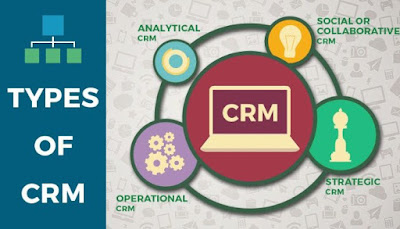What are different types of CRM software?
By Pranjali Manore
As we all know, CRM software is now the biggest
software market globally as companies are competing to win clients.
Gartner's study reveals that the CRM software
market is now worth a quarter of worldwide enterprise application software
revenue, totalling $193.6 billion in 2018. The research also predicts that
customer relationship management value will continue to grow, even up until
2025.
The most important advantage of this software is
that it comes in many forms, irrespective of your companies' size, whether big
or small and how much you're willing to invest, you can find a tool for
you.
In the previous blogs, I have talked about CRM and
its benefits to cover CRM types in general.
There are five different types of CM software.
Let's take a closer look at it.
1. Operational:
Operational CRMs provide your marketing, sales, and
customer service departments the practicability to better support your existing
and potential customers.
As you can structure data about your contacts
within the tool and set systematic procedures, the tool can be used for
automation, including:
- Sales Automation
- Marketing automation
- Service Automation
This way, different departments can function
together on nurturing and closing deals for your company. Your company's
operation improves when every piece of information is in one tool.
Simultaneously, there's less chance of "losing" a deal or
miscommunication between departments.
2. Analytical CRM:
Analytical CRMs help companies better utilize the
information they gather about customers; this can include customer preferences,
channels, points of contact, interest, and many more. The thing is that
operational CRMs attribute customers to the sales funnel, whereas analytical
CRMs help understand them.
Data mining components can gather more information,
including trends, and help recognize patterns in data sets based on the contact
data. This way, companies can use the data they already collect to make better
business decisions.
3. Collaboratives CRM:
Collaborative CRM allows different teams at
organizations to share information about customers. With collaborative CRMs,
you can enhance information exchange between departments like sales and
marketing and support teams. These departments often work separately, which
makes addressing customer's inquiries more difficult to find. In collaborative
CRMs, you can easily manage relationships with your customers.
4. Campaign management CRMs
Campaign management CRMs very often can be
described either as analytical or operational CRMs. The reason is they kind-of
blend the features allowing for collecting customer data and insights to run
marketing or sales campaigns.
However, it is important to distinguish this kind
of CRM solution if your goal is particularly using the contact information to
manage, plan, and analyze better campaigns.
Even running campaigns from a CRM can be made by
integrating popular tools with different email campaign providers.
5. Strategic CRMs
Strategic CRM focuses on customers (sometimes
included in the collaborative CRMs definition). For instance, collecting
information about customers and their interactions and your business may
improve their relationship with them.
Strategic CRM not only gives you insights right
away but instead adjusts or tailors the way you communicate with customers in
the long run. It is a helpful solution if you're in a business where the focus
is on long-term relationships instead of quick sales and short campaigns.
Ending....
Whether a CRM is operational, analytical, or
collaborative, it plays a crucial role in contributing through its key features
and benefits to managing the customer lifecycle. Some systems will specialize
in one of these CRM types, but many include capability across all three. And
the system that's best for you depends on your company's specific
situation.




Very Informative and creative contents. This concept is a good way to enhance the knowledge. thanks for sharing. Continue to share your knowledge through articles like these, and keep posting on
ReplyDeleteData Engineering Services
Artificial Intelligence Solutions
Data Analytics Services
Business Intelligence Solutions
Looking great work dear, I really appreciated to you on this quality work. Nice post.Rapport Logiciel CRM
ReplyDelete